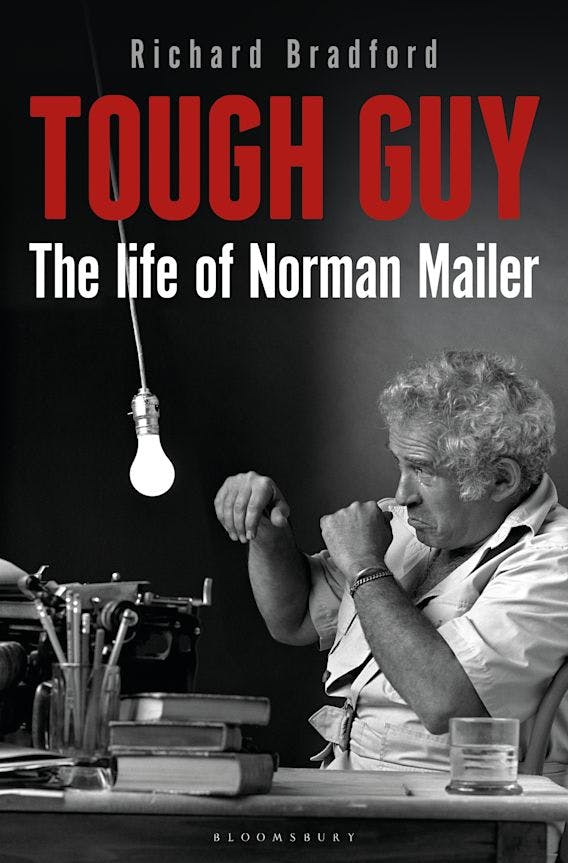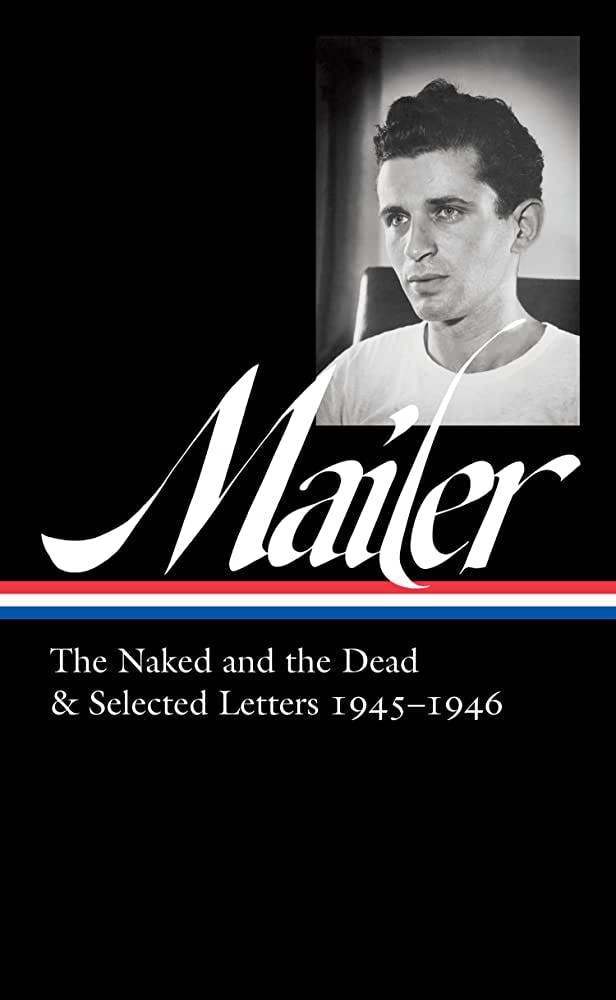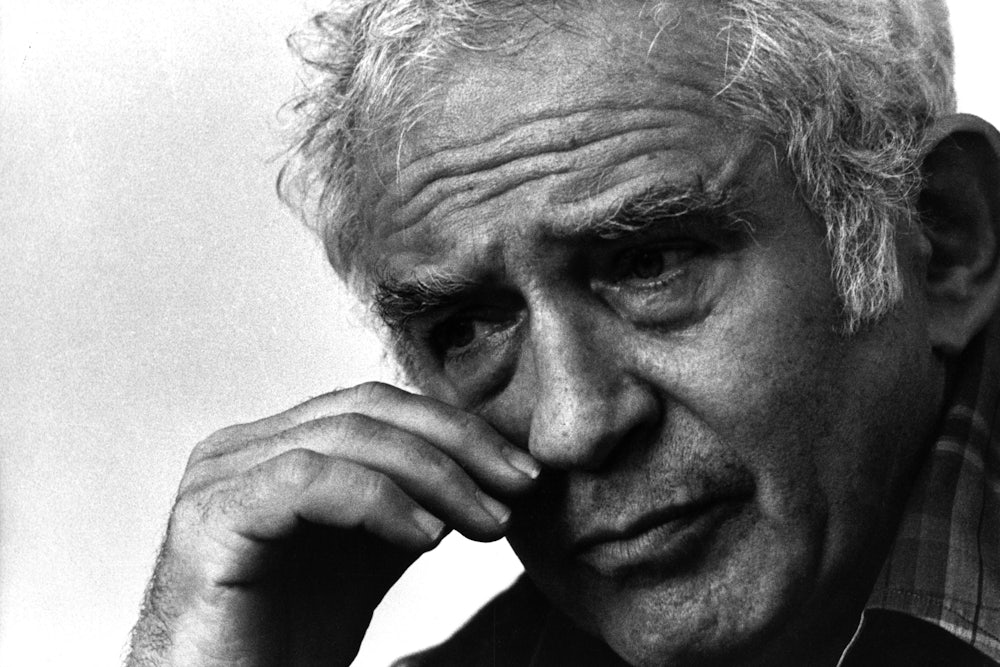“There damn sure ain’t anything special about a man if he can smell as bad as he does when he’s dead,” Red Valsen reflects in Norman Mailer’s 1948 novel The Naked and the Dead. Valsen is a young man who looks at war as a way to get away from a country that never made a home for him, only to find military life as brutal as the Montana mining town where he was raised. His realization is Mailer at his most cynical (and throughout his life, Mailer could be very cynical): The only soldiers who suffer disappointment in The Naked and the Dead are those who believe that the world is presided over by noble forces—America, God, or whatever general happens to be commanding them.
Published when Mailer was 25 years old, The Naked and the Dead remains his greatest fictional achievement—and in honor of Mailer’s centennial this year, Library of America has reissued a new hardback edition along with a new selection of his letters from 1945 to 1946. Well before he experienced war firsthand, Mailer was preparing to write about it; and almost every letter he wrote during his service was designed to record, and organize, his raw experience into an eventual novel. He wrote his first wife, Beatrice, in November 1945, that he planned “to list the names of every man I can remember clearly in the Army—there should be several hundred. Out of them will come a few as themselves and a half dozen more as synthetics of several.” Then he would work out “their relation & attitude toward each of the other men”—an exercise that promised to “lay bare the many as yet unposed problems” and “generate story business.” The war (and life in general) was, for Mailer, what the pit is for a miner or a field is for a farmer—a place to gather what was valuable and put it to proper use.

Mailer’s early prose was raw, clean, experiential, and filled with the sweat and pain of his polyglot American characters—Irish, Polish, Jewish, Catholic, street-raised or Ivy League–educated—all driven by the same primal forces. In his early books and stories, Mailer recognized the common horrors of serving abusive people and institutions; and he was adept at imagining his fictional way into social identities that weren’t his, perhaps a result of his own chameleon-like ability to move from the Jewish suburbs into Harvard’s Waspy social cliques and off again into the troops of widely different men who fought beside him in the Philippines. But into whatever social regions he journeyed—from Hollywood to Manhattan, from university lecture halls to criminal courtrooms and political conventions—he carried with him a deep sense that the people around him were locked in irresolvable conflict with both one another and the institutions for which they served.

Had Mailer remained true to his early methods, he might well have become America’s last great naturalist (an achievement probably best claimed by Mailer’s longtime friend and competitor James Jones). But the years after The Naked and the Dead left him flailing, and he spent more time making promises of great novels to come than he did actually writing them. His gift for courting outrage on talk shows, and the prolific self-centered journalism he produced in the 1950s and ’60s, made him a larger-than-life figure before his reputation began a steep and well-deserved decline in the years leading up to (and continuing after) his death in 2007.
It is in keeping with the prevailing mood that Richard Bradford’s new biography, Tough Guy: The Life of Norman Mailer, published to mark the centenary, offers a somewhat indifferent assessment of Mailer’s career, relying largely on summaries and quotations from earlier biographers. This may be the best biography Mailer deserves: for after all the best possible things have been said about Mailer, it’s hard to feel he made the most of his talent.
Born Nachem Malech Mailer in 1923, he was modestly raised by middle-class Jewish parents—an accountant father who kept two bank accounts in order to hide gambling losses from his wife and a devoted mother whose belief in Mailer’s genius contributed heavily to his monumental self-esteem. He entered Harvard at 16 and was told he could have been admitted a year earlier. Immersed in the great American naturalists John Dos Passos, Theodore Dreiser, John Steinbeck, and James T. Farrell, as well as the modernist eccentricities of William Faulkner, Mailer began producing harsh hard stories about individuals losing the daily battle of American life—men, usually, betrayed by their women, jobs, politicians, and, in his first novel, The Naked and the Dead, the selfishly churning machinery of war.
The period that followed the publication of The Naked and the Dead was one of creative crisis for Mailer. While he still continued to draw on his wartime experience—in stories such as “The Paper House” and “The Language of Men”—he didn’t go on to explore military life more fully (as James Jones did in The Thin Red Line) or the lonely intensity of a writer returning to civilian life (as Jones did in Some Came Running and Go to the Widow-Maker). Instead, the brazenly intelligent Mailer, perhaps influenced by friends in Europe, grew distracted by a desire to write novels of ideas—at which he failed consistently over the next several decades.
His second novel, Barbary Shore, was a sort of Brooklyn-based Darkness at Noon, depicting postwar America as a land in which leftists were being drawn into the circles of government spies and provocateurs, and the narrator (like many of Mailer’s postwar protagonists) is a writer struggling to create meaningful fiction in a country that has no interest in reading it. Meanwhile, the central female character, Guinevere, finds respite from the male world of revolutionary and reactionary intellectuals by taking them all indiscriminately to bed; even her toddler daughter, Monina, seems defined as a threatening, sexual object. (“Oh, she’s got the looks,” Guinevere says. “And don’t think she don’t know it, the little bitch.”)
It’s hard to recall any Mailer female characters who aren’t, like Guinevere, sexually omnivorous; sex seems to be their only means of obtaining power over men, on whom they continually cheat in order to gain more power over the next man to come along. What begins as a No Exit–like tale of lost souls orbiting one another in a cheap boarding house might well have yielded an intriguing second novel. (Mailer later claimed it possessed “a kind of insane insight into the psychic mysteries of Stalinists, secret policemen narcissists, children, Lesbians, hysterics, revolutionaries.”) Yet, as in the final third of The Naked and the Dead, where the doomed patrol gets lost in the mountainous jungles of Anopopei, these characters get lost in the jungles of their (and Mailer’s) uncertain political rhetoric. It’s a novel that doesn’t come to a conclusion so much as fades away into itself.
In the 1950s, Mailer went searching for another discrete human tide pool to examine as closely as one of his favorite writers, Steinbeck, had examined the regions of central California. But when his third novel, The Deer Park (originally conceived as part of an “enormous eight-part novel” that he never came close to finishing), puttered out, Mailer began to write everything but fiction: a column for The Village Voice (which he co-founded); a bad theatrical adaptation of The Deer Park; a book of Advertisements for Myself filled with introductions and afterwords to stuff he had already written, or planned to write, or planned to write but then didn’t. He also began producing a political platform for his first campaign to become mayor of New York City, which came to an abrupt end in November 1960 when he stabbed his second wife, Adele Morales, with a penknife, in an attack that nearly killed her, and was sentenced to two years of probation. (Adele refused to press charges; Mailer would revive his dreams of running for mayor with his 1969 campaign.)
“Encourage the psychopath in oneself!” Mailer demanded. And over the second half of his life, he followed his own advice. He produced nine children with six wives and was reportedly a serial wife abuser (beyond the infamous attack on Morales), as well as a serial adulterer. He head-butted Gore Vidal on a television talk show and staged a tag team–style auditorium panel discussion in which he “took on” four feminists to debate his ridiculous assertions in The Prisoner of Sex. At parties, he showed off his pugilistic skills by sucker-punching guests or insulting the libertinism of fellow authors and their wives.
Mailer was drawn to men who had committed unthinkable acts—prisoners such as Gary Gilmore, who murdered two young Mormon men during robberies that netted him barely a few hundred dollars, and John Henry Abbott, a career criminal who, in the late 1970s, began writing to Mailer about his life in prison. Mailer supported him in his efforts to turn his letters into a book, In the Belly of the Beast, as a result of which Abbott secured a pardon. Within days of his release (and a good review at The New York Times), Abbott murdered a restaurant manager in the East Village after being refused a key to the bathroom.
Out of his relationships with prisoners, Mailer wrote his most successful book, The Executioner’s Song, with help from his researcher and “packager” Lawrence Schiller, who assembled interviews, court transcripts, and correspondence that Mailer delivered in large verbatim chunks throughout the book. A lifetime serial offender, as well as a talented artist, Gilmore (like Mailer) was filled with passionate intensity. With two first-degree murder convictions, he refused to appeal his death sentence and in fact fought to be executed as swiftly as possible, eventually “winning” a long legal battle that resulted in his execution by firing squad in 1977. Unlike Dreiser’s An American Tragedy, in which a young man kills in seeking money and success, Gilmore kills only to echo the damage of his fragile, fractured self; and his story provides all the existential drama that Mailer spent his youth learning to tell. On every page, Mailer presents a sympathetic vision of people with nothing to lose who still manage to keep on losing. They can’t afford the children they bring into the world while they’re still practically children themselves; they can’t afford to keep the cars running that take them back and forth between poorly paying jobs and run-down rental accommodations; and the only consolations they can (barely) afford are cheap booze and sex. Executioner’s Song was Mailer’s only book after The Naked and the Dead that didn’t get weighed down by tendentious philosophical arguments. And while it goes on far too long, it leaves behind a large reverberating memory when it’s over.
It is understandable that Mailer’s tendency to set impossibly high goals for himself led to his long hiatus from fiction in the 1950s and ’60s; what is less understandable is why his production of really bad journalism received so many critical accolades—including a Pulitzer for one of his worst books, The Armies of the Night, in 1969. Originally a series of reported essays for Harper’s, Mailer recounts his involvement with an anti-Vietnam demonstration at the Pentagon, accompanied by roughly 70,000 young people prepared to ignite their draft cards in the company of notable activists that included Dr. Spock, Dwight MacDonald, Robert Lowell, and Abbie Hoffman. Mailer’s representation of events veers wildly from disconnected poetic blather to deeply confusing interior reflections. (Subtitled “History as a Novel; The Novel as History,” it qualifies as neither.)
Over the course of this book, Mailer depicts himself as a jester shaking bells at the bland severity of figures such as Paul Goodman, who calls out the National Security Industrial Association in a speech as “the most dangerous body of men at the present in the world.” What Mailer derides is Goodman’s “dishmop prose,” which “reads like LBJ’s exercises in Upper Rhetoric (the Rhetoric, Mailer now decided, being located three inches below and back of Erogenous Zone Clitoric).” It’s unclear what Mailer means when he locates something called the “Erogenous Zone Clitoric” in relationship to “Upper Rhetoric.” But Mailer doesn’t seem to care if readers understand him or not. He just cares about being heard.
Almost every detail is subsumed by Mailer’s fanciful depictions of himself. Acting as M.C. at a pre-march rally, he stokes himself with bourbon, confessing that “he loved to speak, he loved in fact to holler, and liked to hear a crowd holler back.” He is openly proud of his boorishness, describing how he came up with the idea for his “speech” when he entered an unlit bathroom and, while urinating, missed the bowl. As he goes on to “holler” at the crowd:
Tomorrow, they will blame that puddle of water on Communists which is the way we do things here in Amurrica, anyone of you pinky poos want to object, lemme tell ya, the reason nobody was in the men’s room, and it so dark, is that if there had been a light they’d had to put a CIA man in there and the hippies would grope him silly, see here, you know who I am, why it just came to me, ah’m so phony, I’m as full of shit as Lyndon Johnson. Why, man, I’m nothing but his little old alter ego. That’s what you got right here working for you, Lyndon Johnson’s little old dwarf alter ego. How you like him?
Mailer displays pride in this embarrassing performance, even while members of the audience shout out more salient comments, such as: “Come on, Norman, say something!” But then, as in much of the New Journalism, Mailer is more concerned about describing his inebriated perspective on events than the events themselves.
For Mailer, honesty meant breaking through the corporate façade of righteousness—and one way of doing this, he argued, was through obscenity. “The American corporation executive,” Mailer writes, “who was after all the foremost representative of Man in the world today, was perfectly capable of burning unseen women and children in the Vietnamese jungles, yet felt a large displeasure and fairly final disapproval at the generous use of obscenity in literature and in public.” For Mailer, realism implies a recognition of mankind’s ugliness. In the tedious opening chapters of An American Dream, Rojak strangles his wife after she confesses to having sex with another man, and then goes on to seduce a German woman in the next room, alternating from the holiness of her vagina to the sinfulness of her anus and back again, which he describes as “a raid on the Devil and a trip back to the Lord.” The world is obscene, Mailer implies, and in order to write about such a world, a writer must be obscene along with it. (Mailer also claims he can’t write for The New Yorker because its editors won’t allow him to say “shit.”) It’s a bizarre, adolescent argument that runs throughout Mailer’s mid- and late-period work.
As a result of his wildly lived life, it’s hard to distinguish Mailer’s strengths from his weaknesses—they all seem tangled up in the same visceral mass of anger, intelligence, egotism, and yearning. For what always enlivened Mailer’s imagination (and his combative literary persona) was the idea of war: from the chaotic military confrontations of The Naked and the Dead and Ancient Evenings to the convoluted legal battles of Executioner’s Song.
Unfortunately, his vision made less sense as he drifted off across the telegenic battlefields of American politics and talk show panel discussions. For while Mailer deplored the vast one-eyed medium of television, he was marvelously adroit at manipulating it to his own interests. And he definitely knew how to say things that were so rudely unpredictable that they kept the audience coming back after the next commercial. He also took his role as a public intellectual into the one theater that concerned him after the Pacific—bookstores, where he was always trying to outgun his more successful rivals, William Styron, Gore Vidal, and John Updike.
In pursuit of sales, he wrote the text for a book of photos of Marilyn Monroe (“every man’s love affair with America”), much of which was paraphrased from two previous biographers. (Both declined to sue after a royalty was agreed with the publisher.) His unreadable novel about the CIA, Harlot’s Ghost, concluded with the promise of a sequel that never received an advance big enough to convince him to write it. And even one of his most engaging (and, at the same time, utterly ridiculous) novels, the Spillane-like thriller Tough Guys Don’t Dance—in which two adulterous women get their heads chopped off and tossed into a burlap sack—could neither shock nor titillate its way into anything but a bad movie. (Which was written and directed by Mailer, who else?)
Mailer was the Rousseau of American cultural politics, celebrating himself for his worst qualities. He spoke openly about his misogyny. He defended his “Victorian” opinions about sexuality. (He opposed contraception, claiming that the greatest pleasure of an orgasm was the knowledge that it might result in a pregnancy; he also claimed that “the ultimate direction of masturbation always has to be insanity.”) But most of all, he made excuses for his own wildly crafted persona, which he blamed on “the media,” who were continually carving “ugly pictures on the living tomb of his legend.” But of course, nobody could carve ugly pictures on his tomb better than Mailer. Or as Mailer put it himself: “Sometimes he thought his relation to this image was not unlike some poor fellow who strains his very testicles to bring emoluments for his wife yet is never favored with carnal knowledge of her.” No, that doesn’t make much sense either. But then it’s Mailer.
Mailer was unafraid to appear foolish or ridiculous, and that was the most compelling aspect of his charm. At a time when intellectuals were considered too good for public confrontations, he took a page from Hemingway’s macho mystique and ran it like a wild dog, blundering through fraught relationships with cops, politicians, the Manhattan literati, and late-night talk show hosts. In one of his maddest appearances, while raging about all the things he misunderstood about the feminist movement, he pontificated about how there were “two ways to enter a woman.” And yet it was Dick Cavett’s response that would be remembered longer than anything Mailer himself ever said: “Once again, Norman, words have failed you.” Break for commercial.






